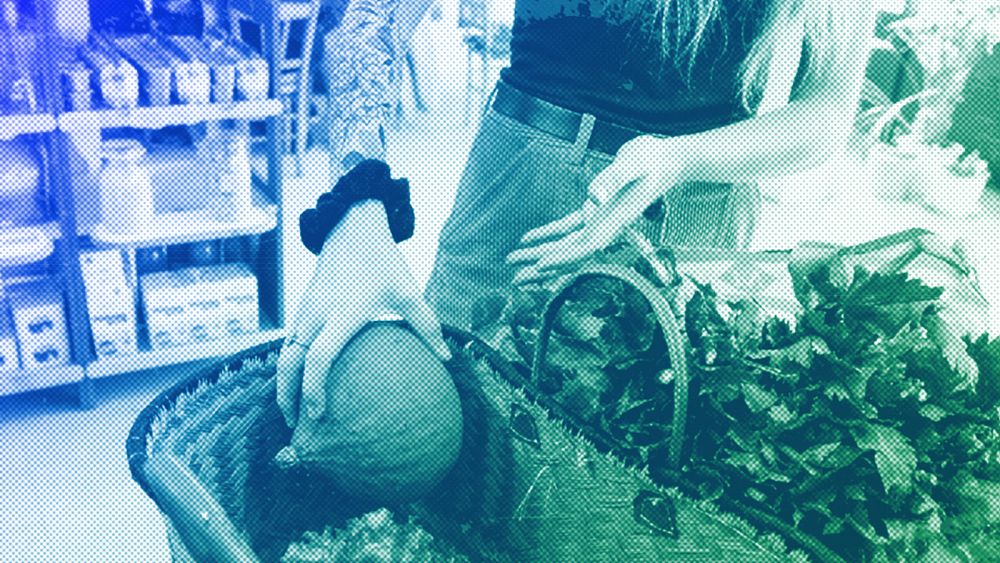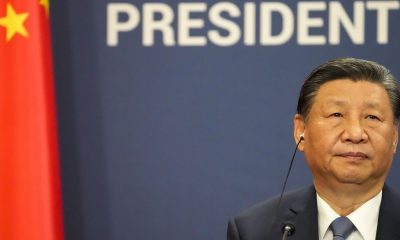General News
Fighting food insecurity means following the urban lead

The opinions expressed in this article are those of the author and do not represent in any way the editorial position of Euronews.
My fellow local leaders and I urge the EU to not further delay action and keep the promises of the European Green Deal, Vice-President of Lyon Métropole Jérémy Camus writes.
On this World Food Day, I write not only in my capacity as Vice-President of Lyon Metropole-Greater Lyon but also as a representative voice of fellow mayors across Europe.
The issue of food insecurity is undeniably one of the most pressing challenges of our age especially considering our system is prone to waste.
The evidence is in the data. According to Eurostat’s calculations, over 58 million tonnes of food waste is produced in the EU each year.
Around 10% of the food available to EU consumers — encompassing retail, food services, and households — may be thrown away. Alarmingly, whilst this waste occurs, over 37 million individuals in the EU are unable to afford a quality meal every other day.
Factors like the rising cost of living, climate change, the Ukraine conflict, and the aftershocks of the COVID-19 pandemic have compounded food accessibility issues.
The European Food Banks Federation recorded that their members could not meet food demand in 2022. Even more worryingly, gainfully employed persons, students and single parents sought material support for the first time in 2022 due to the escalating cost of living.
Hesitance and caution over food legislation?
In the broader European landscape, these numbers and farmers’ difficulties to continue working under current conditions — also caused by climate change — have made the European Commission cautious about the direction of food legislation.
The current line indicates hesitation, especially evidenced by European Commission President Ursula von der Leyen’s decision to call for a strategic dialogue on the future of agriculture and postpone the publication of the Sustainable Food Systems Framework law and other linked legislation.
This postponement can be perceived as a sign of wavering commitment to the ambitious goals set out in the European Green Deal.
The delay highlights the challenges in reconciling sustainability goals within the food system with concerns about growing food insecurity.
According to the United Nations’ “State of Food Security and Nutrition in the World”, European cities and metropolitan areas, rather than rural areas, are experiencing higher levels of food insecurity.
In response, they are setting ambitious goals for a healthier, more sustainable and inclusive food system and can share their knowledge and experience to show the way forward.
What are the cities like Lyon doing?
So, what are cities and metropolises doing? In Lyon Metropole, for example, we want to ensure every resident can access nutritious, quality, and affordable food.
We’ve shortened supply chains by re-localising production, providing fresh produce that is more readily available to our communities. This benefits consumers and supports our local farmers, fostering a more sustainable and resilient food system.
Our commitment to organic food has been reflected in our school canteens, where we promote healthier eating habits from a young age.
We’re also piloting a participatory scheme whereby residents can shape how the local budget is used to combat food insecurity. These measures aren’t isolated actions but part of a broader, systemic change we seek to achieve on our territory.
Lyon Metropole is not alone. Fellow municipalities I met last month at the Eurocities working group on food are going in the same direction, and I witnessed similar experimentations starting all across Europe.
For many European cities and metropolises, food justice isn’t just a phrase — it’s an integrated approach seamlessly woven into our ongoing efforts to enhance food work in our regions. And when I say “region”, I mean an area broader than the metropolis’s borders.
What can the EU do to help?
One of the overarching misconceptions around food security is the distinction between urban and rural. These two environments have traditionally been seen as separate entities with different concerns and solutions.
However, numbers from the European Commission show that approximately 50% of the EU’s rural population lives in proximity to a city, often being part of wider metropolitan areas.
Life in cities, suburbs, and surrounding rural areas overlaps more than ever, leading to a strengthened sense of connection rather than separation.
It is therefore imperative for cities and metropolitan areas across Europe and for European legislation to foster a shared vision between urban and rural neighbours, one that seeks to address food insecurity and promote sustainability.
How can the EU help? For once, the European Union plays a crucial role in safeguarding the right to experiment, enabling local authorities to test innovative solutions tailored to specific contexts.
It can also facilitate the direct use of funds ensuring that resources are channelled efficiently, avoiding potential bureaucratic delays and allowing cities to respond to immediate needs.
Moreover, the EU can create synergies between food policies and overarching social and health strategies.
Recognising and acting on the inextricable ties between these areas can lead to holistic solutions that promote healthier populations, reduced inequalities, and sustainable food systems.
However, there is an evident lack of policy coherence in the current EU legislation.
The conversation around food is not just that
Addressing food security and food justice isn’t a singular task. It spans a spectrum of interconnected domains: agriculture, health and nutrition, social justice, the environment, and even international trade.
It’s about synthesising a consistent EU vision for food’s future, looking at the broader picture, interlinking various sectors and players.
It’s evident that the conversation around food in the EU is not merely about agriculture or even food security in isolation.
It’s about fostering a dialogue that accommodates diverse voices and perspectives, ensuring that everyone can get food on their plates that is not only nutritious and safe but also the product of a fair, sustainable, and coherent system.
My fellow local leaders and I urge the EU to not further delay action and keep the promises of the European Green Deal.
Jérémy Camus (Les écologistes) is the Vice-President of Lyon Métropole Grand Lyon.
At Euronews, we believe all views matter. Contact us at view@euronews.com to send pitches or submissions and be part of the conversation.
Disclaimer: No copyright infringement intended. All rights and credits reserved to respective owner(s).
























